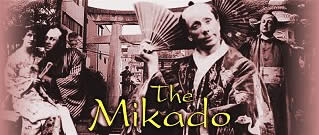 |
 |
||||||
GLOSSARY
Act I
Town of Titipu: There is a town called Chichibu (which is very similar sounding to Titipu) in Japan. It is a centre for the manufacture of silk and cement, and is a few hours northwest of Tokyo by train.
Serried: Shoulder to shoulder.
A-trip: Clear of mud and ready to be hauled aboard.
A-lee: Away from the wind; ready for making sail.
Rumbelow: A meaningless combination of syllables, like ‘yeo-heave-ho’, used as a refrain by sailors when performing a routine or rhythmical task.
To lay aloft: To climb up into the rigging in order to raise or lower sails.
Connubially linked: Married.
Decapited: Gilbert’s shortened version of ‘decapitated’.
Pre-Adamite: Before Adam (and Eve).
Minion: Servant.
Imperfect ablutioner: One whose personal hygiene leaves something to be desired.
Cut a dash: Make a striking impression.
Aver: Declare.
Recognizances: Bond by which a person engages before a court or magistrate to observe some condition, such as paying a debt or keeping the peace.
Piano-organist: Operator of a piano-organ, a mechanical piano constructed like a barrel-organ.
Guy: A grotesquely dressed person.
Nisi Prius: A Latin term meaning literally‘unless before’ which was used in law for civil actions heard in local assize courts. Assize judges were known as ‘nisi prius’ judges.
Genius tutelary: Guardian spirit, guiding influence.
Marine Parade: Sea-side promenade, analogous to "the boardwalk" in the U.S.
Tremendous Swell: A distinguished person.
Lucius Junius Brutus: A Roman consul (500 B.C.) who condemned his two sons to death, for their part in plotting to restore the monarchy.
Con fuoco: Passionately. The phrase is Italian for "with fire".
Yam I should get toko: Yam is sweet potato."Toco" (toko) was Victorian schoolboy slang for punishment. This expression means “instead of something sweet, I shall receive punishment.”
Apostrophe: An exclamatory address to a person or thing.
Condign: Suitable.
Dock: The dock is the place occupied by the prisoner in a court, but can also mean a small enclosed space, or cell (originally, an animal cage).
Perform the Happy Dispatch: Commit suicide.
Equipoise: Equilibrium.
Dole: Share or portion.
Knell: The sound of a bell as at a death or funeral.
There’s lot’s of good fish in the sea: “There are plenty of good fish in the sea” means that you should not worry if you have missed one opportunity, there will soon be another.
O ni! bikkuri shakkuri to!: This choral outburst is variously translated. Some say it means "Demon, you surprise and shock us!" whilst others think that "hiccup" is involved somehow.
Gambado: Caper or escapade.
Act II.
Effulgent: Giving off a flood of light.
Tocsin: A warning bell.
Blue-bottle: A large fly.
Miya sama, etc.: This is a genuine Japanese war song of the Japanese Imperial Army.
Pent: Imprisoned, locked up.
Mystical Germans: A reference to evangelical German Lutherans who had been touring England shortly before The Mikado opened.
Buffer: A shock absorber between coaches on trains.
Parliamentary trains: An Act of Parliament of 1844 required that train companies run at least one train a day which stopped at every station with a fare of one penny per mile. These slow trains were called "Parliamentary trains."
Monday Pops: Popular series of classical music concerts organised by Chappell’s, the music publishers, and held in St. James’s Hall.
Finger stalls: Protective coverings for injured fingers.
Spot that’s always barred: In billiards, a spot-barred game is one in which successive pocketing of the red ball from a spot are disallowed.
Snickersnee: A knife or dagger.
Cervical vertebrae: The seven bones forming the upper part of the spine, the neck bones.
Verisimilitude: Appearance of truth.
Page modified 24 August 2011